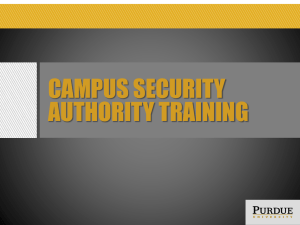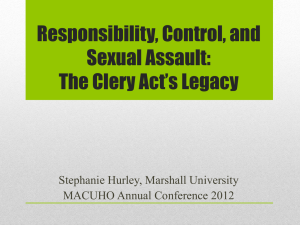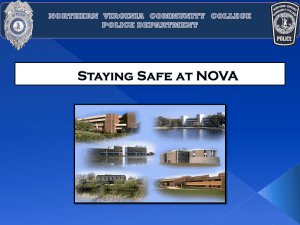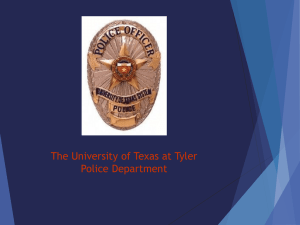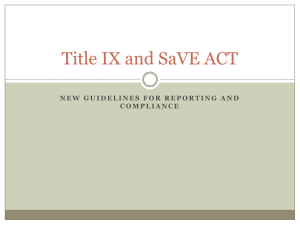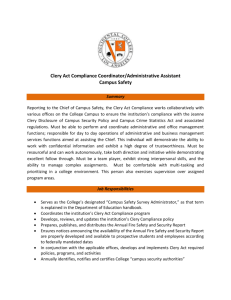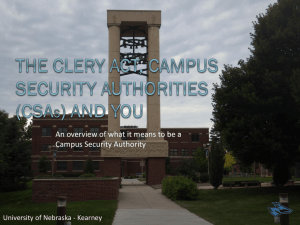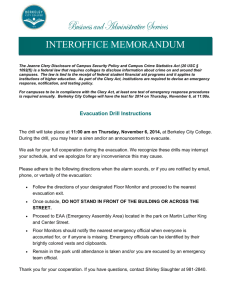Campus Policy 116 VIII. - Western Carolina University
advertisement
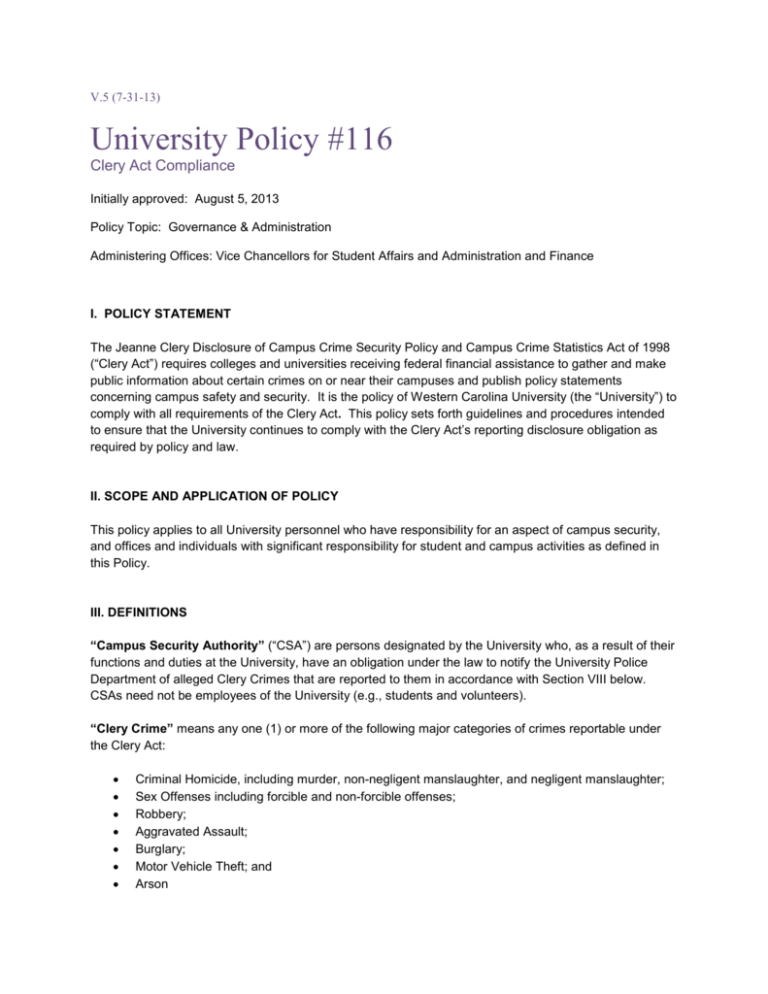
V.5 (7-31-13) University Policy #116 Clery Act Compliance Initially approved: August 5, 2013 Policy Topic: Governance & Administration Administering Offices: Vice Chancellors for Student Affairs and Administration and Finance I. POLICY STATEMENT The Jeanne Clery Disclosure of Campus Crime Security Policy and Campus Crime Statistics Act of 1998 (“Clery Act”) requires colleges and universities receiving federal financial assistance to gather and make public information about certain crimes on or near their campuses and publish policy statements concerning campus safety and security. It is the policy of Western Carolina University (the “University”) to comply with all requirements of the Clery Act. This policy sets forth guidelines and procedures intended to ensure that the University continues to comply with the Clery Act’s reporting disclosure obligation as required by policy and law. II. SCOPE AND APPLICATION OF POLICY This policy applies to all University personnel who have responsibility for an aspect of campus security, and offices and individuals with significant responsibility for student and campus activities as defined in this Policy. III. DEFINITIONS “Campus Security Authority” (“CSA”) are persons designated by the University who, as a result of their functions and duties at the University, have an obligation under the law to notify the University Police Department of alleged Clery Crimes that are reported to them in accordance with Section VIII below. CSAs need not be employees of the University (e.g., students and volunteers). “Clery Crime” means any one (1) or more of the following major categories of crimes reportable under the Clery Act: Criminal Homicide, including murder, non-negligent manslaughter, and negligent manslaughter; Sex Offenses including forcible and non-forcible offenses; Robbery; Aggravated Assault; Burglary; Motor Vehicle Theft; and Arson Dating violence Domestic violence Stalking “Dating Violence” for reporting purposes, the definition of “dating violence” is violence committed by a person – (1) who is or has been in a social relationship of a romantic or intimate nature with the victim; and (2) where the existence of such a relationship shall be determined based on a consideration of the following factors: (i) the length of the relationship; (ii) the type of relationship; and (iii) the frequency of interaction between the persons involved in the relationship. “Domestic Violence” for reporting purposes, the definition of “domestic violence” includes felony or misdemeanor crimes of violence committed by a current or former spouse of the victim - (i) by a person with whom the victim shares a child in common; (ii) by a person who is cohabitating with or has cohabitated with the victim as a spouse; (iii) by a person similarly situated to a spouse of the victim under the domestic or family violence laws of the jurisdiction; or (iv) by any other person against an adult or youth victim who is protected from that person’s acts under the domestic or family violence laws of the jurisdiction. “Stalking” for purposes of reporting, the definition of “stalking” is engaging in a course of conduct directed at a specific person that would cause a reasonable person to – (i) fear for his/her safety or the safety of others; or (ii) suffer substantial emotional distress. “Hate Crime” means a criminal offense against a person or property that is motivated, in whole or in part, by the offender’s bias based on another person’s actual or perceived race, gender, religion, national origin, sexual orientation, gender identity, ethnicity, or disability. Hate crimes are categorized as Group A, which includes all of the Clery Crimes listed above with certain exceptions, and Group B, which includes larceny/theft, simple assault, intimidation, or destruction/damage/vandalism of property. “Annual Security and Fire Safety Report” is the fire safety report required to be published no later than October 1 of each year. “Daily Crime Log” is the log of any and all alleged criminal incidents that are reported to the University Police Department that is maintained for public inspection. “Emergency Notification” means a notification to alert the campus community about significant emergencies or dangerous situations that pose immediate threats to the health and safety of students or University employees. “Fire Log” is the log of any fire that occurs in an on-campus student housing facility that is maintained for public inspection. “Fire” for purposes of fire safety reporting, the definition of fire is any instance of open flame or other burning in a place not intended to contain the burning, or in an uncontrolled manner. “On-Campus Property” means any building or property owned or controlled by the University within the same reasonably contiguous geographic area and used by the University in direct support of, or in a manner related to, the University’s educational purposes, including residence halls. The term also means 2 any building or property that is owned by the University within the same reasonably contiguous geographic area, but controlled by another person (e.g., a food or other retail vendor). “On-Campus Student Housing Facility” means any student housing facility that is owned or controlled by the University, or is located on property that is owned or controlled by the University, and is within the reasonably contiguous geographic area that makes up the campus. “Non-campus Property” means any building or property owned or controlled by a student organization that is officially recognized by the University; or any building or property owned or controlled by the University that is used in direct support of, or in relation to, the University’s educational purposes, is frequently used by students, and is not within the same reasonably contiguous geographic area of the University. “Public Property” means all public property, including thoroughfares, streets, sidewalks, and parking facilities, that is within the campus, or immediately adjacent to and accessible from the campus. “Timely Warning” means a notification to the campus community about crimes that pose a serious or continuing threat to the safety of the campus community, which will aid in the prevention of similar crimes. “Emergency Response and Evacuation Procedures” means the procedures the University will use to immediately notify the campus community upon the confirmation of a significant emergency or dangerous situation involving an immediate threat to the health or safety of students or employees occurring on the campus. IV. UNIVERSITY RESPONSIBILITIES A. Reporting Crimes ANY STUDENT WHO IS THE VICTIM OF A CLERY CRIME IS STRONGLY ENCOURAGED TO IMMEDIATELY REPORT THE CRIME TO THE UNIVERSITY POLICE BY CALLING (828) 227-8911 (EMERGENCY NUMBER). ANY STUDENT WHO IS AWARE OF A CLERY CRIME IS STRONGLY ENCOURAGED TO IMMEDIATELY REPORT THE CRIME TO THE UNIVERSITY POLICE. UNIVERSITY FACULTY AND STAFF WHO ARE AWARE OF A CLERY CRIME ARE REQUIRED TO IMMEDIATELY REPORT THE CRIME TO THE UNIVERSITY POLICE. VISITORS TO THE CAMPUS WHO ARE AWARE OF A CLERY CRIME ARE STRONGLY ENCOURAGED TO REPORT THE CRIME TO THE UNIVERSITY POLICE. The University must compile and disclose statistics of reports of Clery Crimes for its campus, the immediately adjacent public areas and public areas running through the campus, remote classroom facilities, and certain non-campus facilities. In reporting crime statistics, the University will classify crimes based on the Federal Bureau of Investigation’s (FBI’s) Uniform Crime Reporting Handbook (UCR) and in accordance with Clery Act definitions and requirements. Definitions from the FBI’s National IncidentBased Reporting System (NIBRS) edition of the UCR will be used for sex offenses. 3 The University must also compile and disclose statistics concerning Hate crimes, which will be classified according to the FBI’s Uniform Crime Reporting Hate Crime Data Collection Guidelines and Training Guide for Hate Crime Data Collection. The University must also disclose the number of arrests and the number of students referred to the Department of Student Community Ethics (“DSCE”) for disciplinary action related to weapons, drug abuse, and alcohol violations. B. Emergency Notification / Emergency Response and Evacuation Procedures The University shall maintain and disclose emergency response and evacuation procedures that address significant emergencies or dangerous situations that pose immediate threats to the health and safety of students or University employees. University emergency preparedness plans, notification procedures, emergency preparedness information and resources, and emergency training and exercises shall be the responsibility of the University Emergency Manager who may be contacted at (828) 227-3445. The Chief of Police (or his/her designee), the Emergency Manager (or his/her designee), the Emergency Communications Center, and the Office of Communications and Public Relations are jointly responsible for issuing emergency notifications. The University shall maintain and disclose an emergency notification policy that addresses procedures to immediately notify and disseminate information to the campus community upon confirmation of a significant emergency or dangerous situation involving an immediate threat to the health or safety of students or employees occurring on the campus. The policy will address who has the responsibility for confirming and sending the notification, methods and systems that will be used to notify the campus community, and procedures for testing the systems. The University Emergency Manager shall be responsible for maintaining the policy, procedures, and systems required for emergency notification. C. Timely Warning The Chief of Police or his/her designee will issue timely warnings of Clery Crimes that are considered by the University to represent a serious or continuing threat to the campus community. Timely warnings will be communicated in accordance with the policies and regulations maintained by the University Police. D. Policy Statements In accordance with the Clery Act, the University shall maintain and disclose in its Annual Security and Fire Safety Report its policies regarding: how students and others should report crimes and emergencies: http://www.wcu.edu/aboutwcu/campus-services/university-police/index.asp security of and access to University facilities: http://www.wcu.edu/aboutwcu/leadership/office-of-the-chancellor/university-policies/numerical-index/university-policy82.asp 4 crime prevention: http://www.wcu.edu/about-wcu/campus-services/university-police/campussafety-crime-information/ University law enforcement: http://www.wcu.edu/about-wcu/campus-services/universitypolice/index.asp alcohol and drugs: http://www.wcu.edu/about-wcu/leadership/office-of-the-chancellor/universitypolicies/numerical-index/university-policy-38.asp sex offenses: http://www.wcu.edu/about-wcu/leadership/office-of-the-chancellor/universitypolicies/numerical-index/university-policy-53.asp; http://www.wcu.edu/student-life/division-ofstudent-affairs/departments/student-community-ethics/code-of-student-conduct.asp ; and how to obtain sex offender information: http://www.wcu.edu/about-wcu/campusservices/university-police/campus-safety-crime-information/index.asp ; http://sexoffender.ncdoj.gov/ Additionally, under the Violence Against Women Reauthorization Act of 2013, the University must provide: policy statements concerning reporting requirements; policies encouraging accurate and prompt reporting of all crimes to University Police and appropriate law enforcement when the victim wants to or is unable to make a report; statements of the standard of proof/evidence used in sexual assault, stalking, dating violence, and domestic violence cases (e.g., the standard of proof in student disciplinary cases is the “preponderance of the evidence”, which differs from the “beyond reasonable doubt” standard in criminal prosecutions); policies on required educational programs; policies regarding on-going prevention and awareness campaigns; procedures victims should follow (victim resources); procedures for University disciplinary actions, including the requirement of annual training by officials conducting investigations and hearings; and policies on equal opportunity regarding choice of advisors. E. Crime Log / Fire Log / Annual Security and Fire Safety Report The University must publish and distribute the Annual Security and Fire Safety Report no later than October 1st of each year. It must be distributed to all currently enrolled students and all employees in one of two ways: (1) directly by U.S. Postal Service mailings, campus mail, University email or a combination of these methods; or (2) posting the Annual Security and Fire Safety Report on an Internet or Intranet website that is reasonably accessible to enrolled students and to current employees. The University will provide the Annual Security and Fire Safety Report to any prospective student or prospective employee upon request. 5 The University must submit crime statistics and fire statistics from the Annual Security and Fire Safety Report to the Department of Education no later than October 1st of each year. University Police must maintain a daily crime log of all crimes reported to campus security. The daily crime log is available to the public at the University Police Department at the address listed in Section XII. The University must maintain a daily fire log of any fire that occurs in an on-campus student housing facility. Any student housing fire that is reported to a campus official must be documented in the fire log. Reported fires include fires that were already extinguished as well as those discovered while still burning. The Department of Emergency Services will generate the daily fire log, which is available to the public and maintained at the University Police Department. F. Missing Students The University must maintain and follow a missing student policy and notification procedure. The Missing Person Notification Protocol is administered by the Division of Student Affairs and the University Police and may be found at: http://www.wcu.edu/about-wcu/campus-services/university-police/ G. Educational Programs The University conducts educational programs to promote safety awareness, such as Campus Safety Training, Red Zone, and Party Smart. For more information about University safety programs, contact the Office of the Vice Chancellor for Student Affairs at (828) 227-7234 or the University Police at (828) 2277301. V. CLERY COORDINATOR RESPONSIBILITIES The Chancellor shall appoint a University Clery Coordinator. In discharging the responsibilities set forth in this Section V, the Coordinator shall report to the University Chief of Police. The Coordinator shall have the following general responsibilities: Serve as the designated “campus safety survey administrator,” as that term is defined by the Department of Education; Develop and coordinate the University’s Clery Compliance program and related activities, including policy development and implementation; Prepare, publish, and distribute the Annual Security and Fire Safety Report and submit statistics to the Department of Education; Maintain the official list of CSAs, and provide annual training to the CSAs; Gather and consolidate crime and disciplinary referral data from various internal and external sources, such as the DSCE and local and state law enforcement agencies; Coordinate with campus departments to ensure compliance with HEA Fire Safety regulations; Manage the University’s timely warning report program; Collaborate with the Department of Emergency Services to ensure compliance with emergency notification requirements of the Clery Act; 6 Train key University stakeholders on the Clery Act; Maintain an accurate list of buildings and properties owned and/or controlled by the University; Serve as the record custodian for all Clery Act associated records; Serve as the Chair of the Annual Security and Fire Safety Report Committee; and Stay abreast of amendment to the Clery Act and other laws or regulations affecting the Clery Act. VI. ANNUAL SECURITY AND FIRE SAFETY REPORT COMMITTEE RESPONSIBILITIES The Chancellor hereby establishes a University standing administrative committee designated as the Annual Security and Fire Safety Report Committee (“ASSR”). The ASSR shall be responsible for the oversight of the University’s Clery Act compliance activities. The Chair of the ASSR will be the Clery Coordinator. The ASSR shall be comprised of representatives from the University Police Department, Legal Counsel’s Office, Student Affairs Division, the Department of Emergency Services, the Department of Student Community Ethics, Residential Living, Safety and Risk Management, Counseling and Psychological Services, and Intercultural Affairs. VII. UNIVERSITY POLICE DEPARTMENT RESPONSIBLITIES The University Police shall have the authority to investigate crimes and determine, authoritatively, whether a crime took place or is “unfounded”. The University Police shall collect and compile statistics regarding Clery Crimes and shall provide those collected and compiled statistics to the Clery Coordinator on an annual basis. VIII. CAMPUS SECURITY AUTHORITY RESPONSIBILITIES The University CSAs must immediately verbally report via telephone at (828) 227-8911 information about potential crimes, including Clery Crimes, to the University Police Department in accordance with this Policy for investigation, if possible, and potential inclusion in the Annual Security Report. CSAs who are unsure whether an incident is a Clery Crime should report it. Notice to the University Police Department should be made orally where circumstances demand, but shall be followed with written notice. All documentation of a crime report shall be preserved pursuant to federal, state and local law as well as University policy. The Chancellor, members of the Chancellor’s Executive Council, and Deans shall identify persons within their areas who are designated as CSAs under this Policy. The names of all identified persons shall be provided to the Clery Coordinator no later than August 1 of each year. Employees who are hired after August 1 and are designated as CSAs under this policy must be immediately identified to the Clery Coordinator and must receive CSA training within thirty (30) calendar days from the employee’s start date. CSA’s are defined by their University function; not by job title. If someone has significant responsibility for student and campus activities, he or she is a CSA. While an individual’s ordinary responsibilities and functions at the University would not classify them as a CSA, the individual may take on a responsibility which would then qualify them as a CSA, for example, if an employee or volunteer organizes or helps 7 lead a student trip or outing. Individuals who have responsibility for campus security, other than University Police or the Director of Emergency Management, are also CSAs, such as security personnel at athletic events. Individuals in the following offices/positions are CSAs: University Police; Student Crisis Response Team members; Residential Living staff, including Resident Assistants, Resident Directors, and administrative staff; Health Services staff; Emergency services staff; Counseling and Psychological Services staff; Advisors to Recognized Student Organizations; Intercultural Affairs staff; Other Student Affairs Professional staff designated by the Vice Chancellor for Student Affairs; Athletic Director and Assistant Athletic Directors; Athletic coaches and assistant coaches; Athletic trainers; Building coordinators; Director of Highlands Biological Station; Director of Cherokee Center; Director of Programs at Biltmore; Advisors to club sports; Student Support Services staff; Academic Success Centers staff; Deans, Associate/Assistant Deans and their administrative staff; Director of Equal Opportunity and Diversity Programs; Disability Services staff; Advising Center staff; and Office of Undergraduate Studies staff. IX. RETALIATION There shall be no retaliation against anyone who exercises rights under the Clery Act and Title IX. X. RECORD RETENTION The supporting records used in compiling the report shall be retained for three (3) years from the latest publication of the report to which they apply. Records to be kept include, but are not limited to, copies of crime reports; the daily crime logs; records for arrests and referrals for disciplinary action, timely warning and emergency notification reports; documentation, such as letters to and from local police having to do with Clery Act compliance, letters to and from CSAs; correspondence with the Department of Education regarding Clery Act compliance; and copies of notices to student and employees about the availability of the Annual Security Report. All documentation should be dated. 8 XI. POLICY REVIEW This policy shall be reviewed and revised as necessary every two (2) years. XII. RELATED POLICIES AND RESOURCES University Policies: http://www.wcu.edu/about-wcu/leadership/office-of-the-chancellor/universitypolicies/index.asp University Policy #38, Illegal Drugs and Illegal Use or Abuse of Alcohol: http://www.wcu.edu/aboutwcu/leadership/office-of-the-chancellor/university-policies/numerical-index/university-policy-38.asp Student Affairs/Student Life/Where to Go for Help: http://www.wcu.edu/student-life/where-to-go-forhelp.asp Student Affairs/Helping Students: http://www.wcu.edu/student-life/division-of-student-affairs/studentconcern-response-team/what-is-a-student-concern/helping-students/index.asp Guide for Assisting Students in Need: http://www.wcu.edu/WebFiles/PDFs/Helping_Students.pdf Student Affairs/ Department of Student Community Ethics: http://www.wcu.edu/student-life/divisionof-student-affairs/departments/student-community-ethics/index.asp Code of Student Conduct: http://www.wcu.edu/student-life/division-of-studentaffairs/departments/student-community-ethics/code-of-student-conduct.asp Emergency Preparedness: http://www.wcu.edu/about-wcu/campus-services/universitypolice/emergency-preparedness/ University Police Contact Information: University Police Department 114 East University Way Cullowhee, NC 28723 9 (828) 227-7301 (Police services and non-emergencies) (828) 227-8911 (Emergencies) University Police Website: http://www.wcu.edu/about-wcu/campus-services/university-police/index.asp Campus Safety and Crime Information: http://www.wcu.edu/about-wcu/campus-services/universitypolice/campus-safety-crime-information/index.asp Daily Activity Reports: http://www.wcu.edu/about-wcu/campus-services/university-police/daily-activityreports.asp Clery Act Annual Safety Report: http://www.wcu.edu/about-wcu/campus-services/universitypolice/campus-safety-crime-information/annual-safety-report/index.asp NC Sex Offender Registry: http://sexoffender.ncdoj.gov/ FBI Uniform Crime Report: http://www.fbi.gov/about-us/cjis/ucr/ucr REACH of Macon County Macon Office: (828) 369-5544 Jackson Office: (828) 586-8969 http://www.reachofmaconcounty.org/home/ Jackson County Sheriff’s Office 399 Grindstaff Cove Road Sylva, NC 28779 (828) 586-8901 911 (Emergency) jacksonnc.org 10
